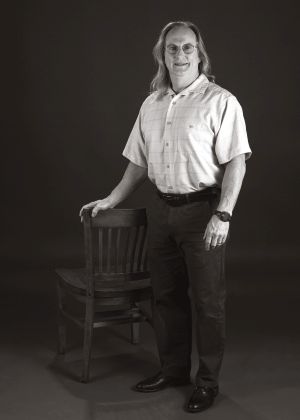Kent Neuerburg
President's Award for Excellence in Research
ACHIEVING BALANCE
Balance. This year’s recipient of the President’s Award for Excellence in Research and Professor of Mathematics Kent Neuerburg is all about balance, something he has strived to achieve throughout his 21-year career at Southeastern.
“Dr. Neuerburg has consistently maintained an effective balance of commitment to teaching, research, and service throughout his professional career,” said Mathematics Department Head Timothy Hudson. “While ensuring that his students receive the best possible classroom experience and compiling an impressive record of professional service, he has shown a clear vision and devotion to his long-term research agenda that has resulted in a significant body of research activity, including an impressive publication record in peer-reviewed journals and books, conference presentations, conference organization, and refereeing and reviewing research papers.”
Neuerburg’s general area of mathematical research is algebra, but in a broad sense. He has a wide background and has done research in diverse areas of mathematics, including algebraic geometry, commutative ring theory, near-ring theory, and graph theory, as well as computational mathematics and statistics.
He has published in the areas of algebraic geometry, near-rings, and pedagogy in 17 refereed papers and one book chapter. He has also served as an associate editor for a book, a rarity for a mathematics professor. Five of his papers have appeared in Communications in Algebra and the Journal of Algebra, two highly respected abstract algebra journals. And according to Google Scholar, his work has been cited in 60 papers, almost none of which are self-citations.
In addition to his teaching load, Neuerburg also served as director of Southeastern’s Honors Program from 2007 to 2011 and as director of Honors and International Initiatives from 2011 to 2016.
“I have contributed to the knowledge base of my discipline through a course of quality publications in respected journals, to the greater research community through a broad range of support efforts, and to Southeastern through white papers written while Director of Honors and International Initiatives,” Neuerburg said. “Over the scope of my career, I have not only deepened my research in theoretical mathematics, but have also broadened my areas of inquiry through interdisciplinary collaboration.”
Neuerburg’s research agenda remains full. Currently, he is working on two projects in algebra. The first is a sole-authored paper extending work from four of his earlier papers on the concept of covers of groups and vector spaces to covers of modules.
The second project is a joint effort with Southeastern Mathematics Professor Alan Cannon that continues previous work on centers of near-rings.
In addition to continuing his work in algebra, Neuerburg has recently begun working on interdisciplinary projects with a colleague in the social sciences. They have already had one paper accepted in the International Journal of Climate Change: Impacts and Responses titled “Climate Change as a Critical Security Threat,” which they presented in 2018 at the Global Studies Conference in Granada, Spain.
“In this paper I was able to provide the statistical analysis that helped us to design and develop a model that uses population, geographic, economic, and political factors that could be affected by climate change to develop a measure of potential governmental instability induced by a rise in sea levels caused by climate change,” he explained.
With additional projects under development, Neuerburg said the interdisciplinary collaboration has been very useful, as he can use the research in his teaching.
“The work I have done on these projects can be directly incorporated into my classes as examples of the application of the statistical principals being studied,” he said.
Neuerburg has given 24 professional presentations and helped organize seven conferences, including an international conference held at Southeastern in 2011.
“I have heard mathematicians at conferences ask Kent how many doctoral students he has. When informed that Southeastern does not have a graduate program in mathematics, they are shocked,” said Cannon. “This is a testament to the quality of research and effectiveness of presentation that he does. Kent’s record of research elevates Southeastern’s reputation and enhances its teaching mission.”







